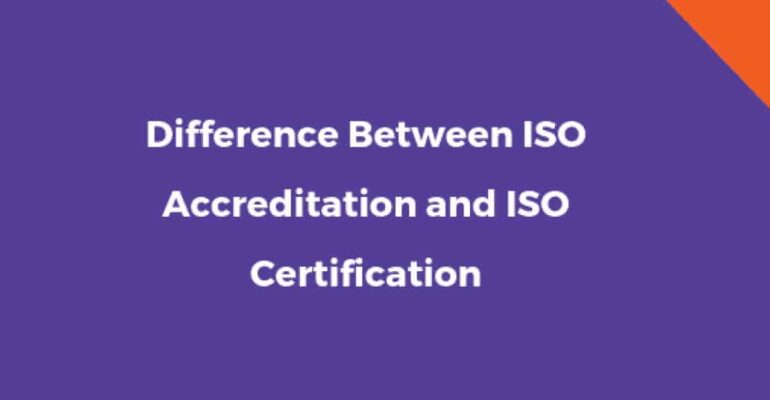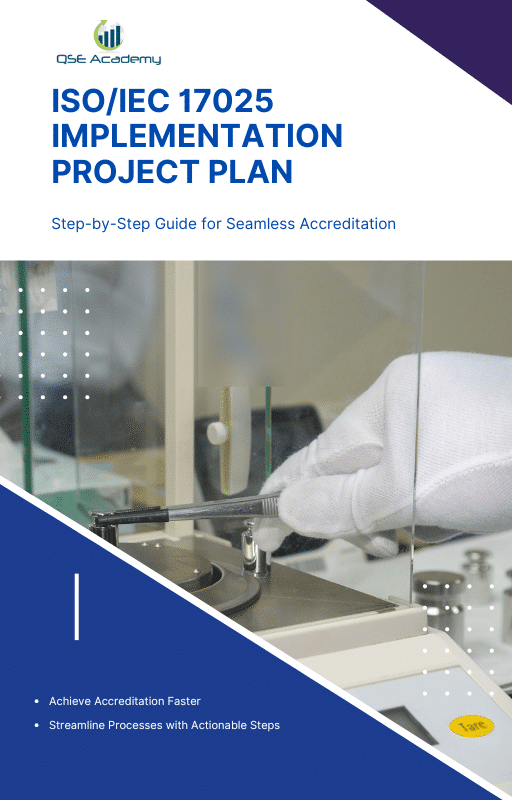ISO认可和ISO认证之间的区别。
ISO认可和ISO认证
两者都是 认证 和 认证 当涉及到ISO和质量管理系统时,这些因素是必不可少的。
各组织往往将这两者混为一谈,从而导致不了解它们各自所需的过程。
原则上,评审和认证是相似的,但它们在谁来做这件事上却有所不同。
ǞǞǞ International Organisation for Standardisation (ISO) creates thousands of standards per year, covering various disciplines and topics.
它产生了一组 标准 被称为 management system standards 以指导各组织提供安全、有弹性、环保和优质的商品和服务。
一些著名的标准包括 ISO 9001 (质量管理)ISO 27001 (Information Security). There’s also the ISO 22301 (业务连续性)和 ISO 14001 (环境)。不久,该 ISO 45001 (健康和安全)将被启动。
在有些情况下,组织有义务执行这些标准。 这就是评审和认证之间的混淆之处。
为了使你的组织免于这种麻烦,QSE学院创建了这个帖子来解释 ISO之间的差异 认可和ISO认证。
Understanding ISO Accreditation
Definition of ISO Accreditation
ISO accreditation involves formal recognition by an authoritative third-party assessment body that a certification body is competent to perform specific tasks. Accreditation bodies assess certification bodies to ensure they meet the necessary standards for competence, impartiality, and consistent operation. This process validates that certification bodies are qualified to audit and certify other organizations.
Purpose of Accreditation
The primary purpose of accreditation is to ensure that certification bodies are impartial and competent. This builds trust in the certification process, ensuring that certifications are reliable and credible. Accreditation enhances the quality and credibility of certification services, which is crucial for maintaining confidence among stakeholders and clients.
认证程序s
The process of obtaining ISO accreditation involves several steps. First, certification bodies must apply to an accreditation body, submitting detailed documentation about their processes and competencies. The accreditation body then conducts a thorough assessment, including on-site audits and evaluations of the certification body’s management systems and practices. Certification bodies must demonstrate compliance with standards like ISO/IEC 17021 to achieve accreditation.
Understanding ISO Certification
Definition of ISO Certification
ISO certification is the process by which an organization is assessed and verified to comply with specific ISO standards. Certification bodies conduct audits to evaluate whether an organization’s management system meets the requirements of a particular ISO standard, such as ISO 9001 for quality management or ISO 14001 for environmental management.
Purpose of Certification
Certification demonstrates an organization’s stakeholder commitment to adhering to internationally recognized standards. It provides assurance to customers, stakeholders, and regulatory bodies that the organization operates effectively and meets high-quality standards. Certification can enhance an organization’s reputation, improve operational efficiency, and open up new market opportunities.
认证程序s
The certification systematic approach typically involves several stages. Organizations must first implement the required management systems and processes. Once ready, they apply to a certification body for an audit. The certification body conducts an initial audit to assess compliance with the relevant ISO standard. If the organization meets the requirements, it receives certification. Regular surveillance audits ensure ongoing compliance.
Key Differences Between ISO Accreditation and Certification
Scope and Focus
The primary difference between accreditation and certification lies in their focus. Accreditation focuses on the certification bodies, ensuring they are competent and impartial. Certification, on the other hand, focuses on organizations and their compliance with specific ISO standards.
Authority and Responsibility
Accreditation bodies, such as the International Accreditation Forum (IAF) and national bodies like the American National Standards Institute (ANSI), oversee accreditation. They ensure certification bodies operate impartially and competently. Certification bodies, such as Bureau Veritas or SGS, are responsible for certifying organizations.
Standards and Requirements
Different ISO standards govern accreditation and certification. For accreditation, standards like ISO/IEC 17025 outline requirements for accreditation bodies. For certification, standards such as ISO 9001 or ISO 14001 specify requirements for organizations’ management systems.
Evaluation and Assessment
Accreditation involves a detailed assessment of certification bodies, including their management systems, audit processes, and personnel competence. Certification involves evaluating an organization’s compliance with specific ISO standards through audits and assessments.
全球环境中的认证和认可
一般来说。 认可和认证都是全球公认的.然而,一些监管机构或客户可能要求获得认可的认证。同时,有些时候,获得认证就足够了。
Do note that an accredited 认证机构 cannot offer any assistance with the ISO standard‘s implementation.
认证机构必须获得许可才能进行认证审核和颁发证书。因此。 认证机构通过认证确保其执照.另一方面。 公司只需获得认证.
Normally, there’s only one accreditation body per country. 认可机构必须符合ISO 17011的要求。,这决定了认证的过程。
ISO认可与ISO认证
ISO认证 和ISO认证经常被交替使用。在某些情况下,它们甚至是同时进行的。
ISO认证是针对某些活动授予组织的,而ISO认证则涵盖整个公司。
ISO的网站也澄清了认证和证书之间的区别。根据该网站的说法。
|
"由一个独立机构(一般称为认证机构)正式承认一个认证机构按照国际标准运作"。 |
"由一个独立机构提供书面保证(证书),证明有关产品、服务或系统符合特定要求。" |
"由一个独立机构提供书面保证(证书),证明有关产品、服务或系统符合特定要求。"
Therefore, ISO develops 国际标准s but isn’t involved in the 认证程序s. Also, it doesn’t issue certificates.
什么是ISO认证?
ISO accreditation is an authoritative body’s 正式承认 的。 能力 按照规定的标准工作。
同样,认证是一个独立的第三方 认可 的认证。
所有认证标准都包含了质量管理体系的原则,包括ISO 9001质量管理体系标准中的原则。
简单地说,通过ISO认证意味着一个组织已经达到了某个标准的质量管理体系的要求。比如说。 ISO 9001质量管理体系.
因此,当一个组织在经过一个认证机构的认证过程后,达到了ISO标准,就会发生ISO认证。
什么是ISO认证?
ISO certification means 获得第三方的书面保证。这是在证明一个过程、产品或服务符合特定要求之后。
另外,它是对一个组织的产品或系统的第三方认可。
ISO认证包括根据国际公认的标准对提供校准、检查和测试、检验服务的组织进行评估。
同样地,它意味着证明一个组织肯定符合相关的标准。然而,它并不涉及实施额外的控制或要求。
虽然,ISO认证包括一个独立的组织或认证机构来进行审计。
一个 ISO认证 is conferred for three years 如果一个组织符合要求并被推荐进行认证。

The Role of Accreditation Bodies
Functions and Responsibilities
Accreditation bodies are responsible for accrediting certification bodies. They ensure that these bodies operate impartially and competently, providing reliable certification services. Accreditation bodies establish and enforce standards, conduct assessments, and monitor certification bodies’ performance capability.
Examples of Accreditation Bodies
Examples of prominent accreditation bodies include the International Accreditation Forum (IAF) and national accreditation bodies like the North America National Standards Institute (ANSI) and the United Kingdom Accreditation Service (UKAS). These bodies play a crucial role in maintaining the integrity of the certification process.
Impact on Certification Bodies
Accreditation bodies ensure that certification bodies maintain high standards of competence and impartiality. This continuous monitoring and evaluation help certification bodies improve their processes and uphold the quality of their services.
The Role of Certification Bodies
Functions and Responsibilities
Certification bodies certify organizations against ISO standards. They conduct audits and assessments to verify that an organization’s management system complies with the relevant ISO standard. Certification bodies must operate impartially and competently to provide credible certification services.
Examples of Certification Bodies
Prominent certification bodies include Bureau Veritas, SGS, and Lloyd’s Register. These organizations provide certification services across various industries, helping businesses achieve and maintain compliance with ISO standards.
Impact on Organizations
Certification bodies help organizations improve their quality and compliance. Achieving ISO certification can enhance an organization’s reputation, increase customer confidence, and open new market opportunities. Certification demonstrates a commitment to maintaining high standards and continuous improvement.
ISO认可和认证的好处是什么?
一个努力遵守标准并获得认证的组织可以获得以下好处。
- 很容易向客户和有关方面证明合规性。
- Being independently and globally recognized for its efforts, quality products, and services.
- 提升对客户的保证。
- 更好的内部管理和流程。
- 提高生产力、效率和利润。
- 保证客户获得和保留。
在遵守ISO标准时,了解ISO认可和ISO认证之间的区别是有用的信息。它们之间的联系以及它们的好处也是至关重要的因素。
对于ISO认证和ISO证书之间的区别,外界有很多困惑。简而言之,区别在此。
ISO accreditation is an independent third-party conformity assessment body of an organization’s ability to meet specific standards. For example, an organization might be accredited by the International Organization for Standardization (ISO) to show that it has the necessary capabilities to perform ISO audits.
另一方面,ISO认证是在对一个组织进行评估并发现其符合某一特定标准后,由认可的认证机构授予。例如,一个组织可能被认证为ISO 9001,这意味着它已经满足了ISO 9001质量管理体系标准的所有要求。
因此,简而言之,为了认证需要认可,但认证不一定取决于认可。然而,许多组织选择同时寻求认可和认证,以证明他们对质量和持续改进的承诺。
你对ISO认可和认证之间的区别有任何疑问吗?请在下面的评论中告诉我们!
如果你想了解更多关于ISO认证和ISO认证如何影响你的组织,请随时查看我们的工具包和套餐。QSE学院也有一个ISO专家顾问团队,他们可以指导你。
Challenges and Solutions in ISO Accreditation and ISO Certification
Common Challenges
Common challenges in achieving ISO accreditation and certification include understanding complex requirements, managing resource constraints, and ensuring continuous compliance. Both processes require significant time and effort, which can be daunting for organizations and certification bodies alike.
Overcoming Challenges
Effective planning and preparation are key to overcoming these challenges. Seeking expert guidance and support can simplify the process and ensure compliance with ISO standards. Regular training, internal audits, and continuous improvement practices are essential for maintaining accreditation and certification.
持续改进
Continuous improvement is crucial for sustaining ISO accreditation and certification. Organizations and certification bodies must regularly evaluate and enhance their processes to adapt to changing standards and requirements. This proactive approach ensures long-term compliance and operational excellence.
Future Trends in ISO Accreditation and ISO Certification
Evolving Standards and Requirements
ISO standards are continuously evolving to address new challenges and opportunities. Organizations and certification bodies must stay informed about updates and revisions to ensure ongoing compliance. Future trends may include new standards for emerging industries and technologies.
技术进步
Technological advancements are transforming the accreditation and certification landscape. Digital tools and platforms streamline audit processes, improve data management, and enhance transparency. Organizations and certification bodies can leverage these technologies to improve efficiency and accuracy in business operations.
Globalization and Market Dynamics
Globalization is increasing the importance of international accreditation and certification. As markets become more interconnected, achieving ISO accreditation and certification can enhance global competitiveness. Organizations must adapt to dynamic market conditions and international standards to succeed.
ISO accreditation and certification play distinct yet complementary roles in ensuring the quality and reliability of certification processes and organizational management systems. Understanding the differences between these processes is crucial for quality managers and business owners. Accreditation focuses on the competence and impartiality of certification bodies, while certification assesses organizations’ compliance with specific ISO standards.
Achieving ISO accreditation and certification provides numerous benefits, including enhanced credibility, improved operational efficiency, and regulatory compliance. For certification bodies and organizations alike, these processes demonstrate a commitment to quality and continuous improvement, fostering trust among clients and stakeholders.
寻找有关 ISO 9001 的更多资源?
如果本文对您有所帮助,请浏览我们旨在帮助您高效获得 ISO 17020 认证的优质资源:
- 📦 完整的 ISO/IEC 9001 2015 文件包: 获取快速、轻松实施所需的所有基本模板和文件。
- 🎓 ISO/IEC 9001 2015 在线课程 : 参加我们的综合培训,掌握获得认证的关键概念和实际步骤。
- 📋 ISO/IEC 9001 2015 检查表: 下载我们的详细核对表,确保您已完成流程的每个步骤。
这些资源可满足您的需求,确保您顺利通过认证。 今天就来探索它们,离成功更近一步!














评论 (1)
萨拉-史密斯
谢谢你提供的关于ISO认证的信息。我想为我的团队建立一个ISO培训。我们将开始寻找一个提供自学方法的培训。 https://www.icertworks.com/iso-22301-training-lead-auditor.php